TimTaiLieu.vn - Tài liệu, ebook, giáo trình, đồ án, luận văn
Tổng hợp tất cả tài liệu, ebook, giáo trình Sinh Học chọn lọc và hay nhất.

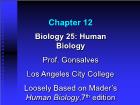 Bài giảng Biology 25: Human Biology - Chapter 12
Bài giảng Biology 25: Human Biology - Chapter 12Muscular System Components: Skeletal muscles. Functions: Skeletal muscle contraction allows for voluntary movement: Movement and locomotion. Mechanical work: Lifting, pulling, pushing objects. Communication: Body language and facial expression. Homeostatic Role: Allows animals to respond to and control their environment.
 61 trang | Chia sẻ: nguyenlinh90 | Ngày: 23/07/2019 | Lượt xem: 1035 | Lượt tải: 0
61 trang | Chia sẻ: nguyenlinh90 | Ngày: 23/07/2019 | Lượt xem: 1035 | Lượt tải: 0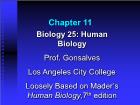 Bài giảng Biology 25: Human Biology - Chapter 11
Bài giảng Biology 25: Human Biology - Chapter 11Skeletal System Components: Bones, ligaments, and cartilage. Functions: Along with muscular system: Movement and locomotion. Mechanical work: Lifting, pulling, pushing objects. Body support. Protection of delicate internal organs (brain, heart, lungs, etc.) Calcium storage Homeostatic Role: Helps maintain constant blood calcium levels.
 33 trang | Chia sẻ: nguyenlinh90 | Ngày: 23/07/2019 | Lượt xem: 901 | Lượt tải: 0
33 trang | Chia sẻ: nguyenlinh90 | Ngày: 23/07/2019 | Lượt xem: 901 | Lượt tải: 0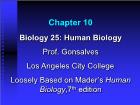 Bài giảng Biology 25: Human Biology - Chapter 10
Bài giảng Biology 25: Human Biology - Chapter 10Excretory (Urinary) System Components: Kidneys, bladder, urethra, and associated ducts. Functions: Kidneys remove nitrogen containing waste from blood. Urine with waste is temporarily stored in bladder. Excretion of urine. Homeostatic Role: Regulates water levels in body. Removes excess water Helps conserve water
 47 trang | Chia sẻ: nguyenlinh90 | Ngày: 23/07/2019 | Lượt xem: 1211 | Lượt tải: 0
47 trang | Chia sẻ: nguyenlinh90 | Ngày: 23/07/2019 | Lượt xem: 1211 | Lượt tải: 0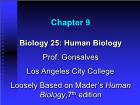 Bài giảng Biology 25: Human Biology - Chapter 9: Human Respiratory System
Bài giảng Biology 25: Human Biology - Chapter 9: Human Respiratory SystemHuman Respiratory System Functions: Works closely with circulatory system, exchanging gases between air and blood: Takes up oxygen from air and supplies it to blood (for cellular respiration). Removal and disposal of carbon dioxide from blood (waste product from cellular respiration). Homeostatic Role: Regulates blood pH. Regulates blood ox...
 48 trang | Chia sẻ: nguyenlinh90 | Ngày: 23/07/2019 | Lượt xem: 1019 | Lượt tải: 0
48 trang | Chia sẻ: nguyenlinh90 | Ngày: 23/07/2019 | Lượt xem: 1019 | Lượt tải: 0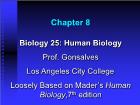 Bài giảng Biology 25: Human Biology - Chapter 8
Bài giảng Biology 25: Human Biology - Chapter 8Introduction Resistance: Ability to ward off disease. Nonspecific Resistance: Defenses that protect against all pathogens. Specific Resistance: Protection against specific pathogens. Susceptibility: Vulnerability or lack of resistance.
 71 trang | Chia sẻ: nguyenlinh90 | Ngày: 23/07/2019 | Lượt xem: 970 | Lượt tải: 0
71 trang | Chia sẻ: nguyenlinh90 | Ngày: 23/07/2019 | Lượt xem: 970 | Lượt tải: 0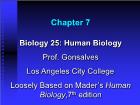 Bài giảng Biology 25: Human Biology - Chapter 7
Bài giảng Biology 25: Human Biology - Chapter 7Blood Vessels Include arteries, arterioles, capillaries, venules, and veins. Double circuit, closed system: 1. Pulmonary circuit: Delivers blood to lungs. Oxygenation of blood. 2. Systemic circuit: Delivers oxygenated blood to tissues and organs of body (brain, liver, heart, kidneys, etc). Picks up carbon dioxide produced by tissues.
 44 trang | Chia sẻ: nguyenlinh90 | Ngày: 23/07/2019 | Lượt xem: 1094 | Lượt tải: 0
44 trang | Chia sẻ: nguyenlinh90 | Ngày: 23/07/2019 | Lượt xem: 1094 | Lượt tải: 0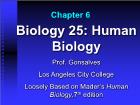 Bài giảng Biology 25: Human Biology - Chapter 6
Bài giảng Biology 25: Human Biology - Chapter 61. Blood Average Blood Volume: 4 to 6 liters. Blood composition: 55% Plasma (fluid matrix of water, salts, proteins, etc.) 45% Cellular elements: Red Blood Cells (RBCs): 5-6 million RBCs/ml of blood. Contain hemoglobin which transport oxygen and CO2. White Blood Cells (WBCs): 5,000-10,000 WBCs/ml of blood. Play an essential role in immunity a...
 46 trang | Chia sẻ: nguyenlinh90 | Ngày: 23/07/2019 | Lượt xem: 877 | Lượt tải: 0
46 trang | Chia sẻ: nguyenlinh90 | Ngày: 23/07/2019 | Lượt xem: 877 | Lượt tải: 0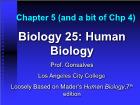 Bài giảng Biology 25: Human Biology - Chapter 5: Integumentary System
Bài giảng Biology 25: Human Biology - Chapter 5: Integumentary SystemIntegumentary System Components: Hair, skin, and nails. Functions: Protects the body from: Infection: Barrier to microbes. Mechanical injury Excessive heat or cold: Thermoregulation Water loss Communication: Receives stimuli from environment Gives out subtle signals (blushing, etc.). Homeostatic Role: Helps maintain constant body temp...
 56 trang | Chia sẻ: nguyenlinh90 | Ngày: 23/07/2019 | Lượt xem: 1007 | Lượt tải: 0
56 trang | Chia sẻ: nguyenlinh90 | Ngày: 23/07/2019 | Lượt xem: 1007 | Lượt tải: 0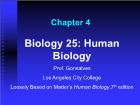 Bài giảng Biology 25: Human Biology - Chapter 4
Bài giảng Biology 25: Human Biology - Chapter 4I. Life is based on many structural levels Levels of animal structure: Atoms and molecules Cells Tissues Organs Organ systems Organism: May consist of a single cell or a complex multicellular organism.
 42 trang | Chia sẻ: nguyenlinh90 | Ngày: 23/07/2019 | Lượt xem: 887 | Lượt tải: 0
42 trang | Chia sẻ: nguyenlinh90 | Ngày: 23/07/2019 | Lượt xem: 887 | Lượt tải: 0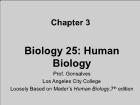 Bài giảng Biology 25: Human Biology - Chapter 3
Bài giảng Biology 25: Human Biology - Chapter 3Cell Theory: Developed in late 1800s. 1. All living organisms are made up of one or more cells. 2. The smallest living organisms are single cells, and cells are the functional units of multicellular organisms. 3. All cells arise from preexisting cells.
 96 trang | Chia sẻ: nguyenlinh90 | Ngày: 23/07/2019 | Lượt xem: 1228 | Lượt tải: 0
96 trang | Chia sẻ: nguyenlinh90 | Ngày: 23/07/2019 | Lượt xem: 1228 | Lượt tải: 0
Website đang trong thời gian thử nghiệm, chờ xin giấy phép của Bộ TT & TT.

